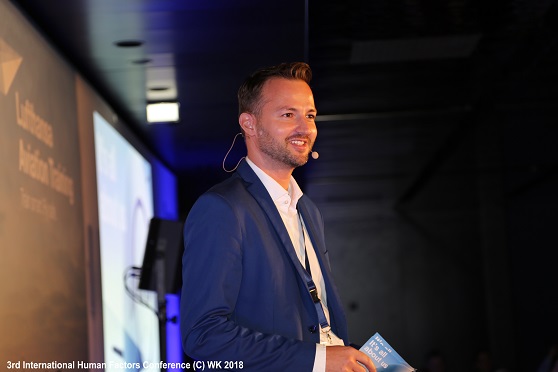In aviation, "Human Factors Training" is an essential component of basic and advanced training for cabin and cockpit personnel. In Crew Resource Management (CRM), competencies such as team communication and decision-making are trained. For several years now, Lufthansa Aviation Training (LAT) has been offering further training for medical personnel in addition to classic CRM training. Mr. Egerth, how did the idea come about to expand the offering to another industry?
Egerth: Aviation recognized very early on, and unfortunately also painfully through individual incidents, the role that the human factor plays in the overall structure of a flight and that through training, the introduction of checklists, the establishment of a safety culture and the improvement of automation, the human factor can become the safety factor. Other industries therefore see aviation as a great role model when it comes to safety, the human factor and teamwork. A few years ago, the German Society for Orthopedics and Trauma Surgery approached me. After all, the interpersonal situation in an operating room, for example, is similar to the interaction of a crew on board. That was the starting signal for a sustainable, interdisciplinary and interprofessional training concept for all people working in the healthcare sector. The goal was and is to strengthen the human factor through competence-based training, to develop psychologically safe teams and thereby to increase staff and patient safety.
What are the similarities and differences in the training of flight crews and medical professionals? Are the same competencies trained in the courses?
Egerth: The differences are not great, because the competencies needed for everyday life and challenging situations are very similar. It's about communication, appearance, attitude, error management, situational awareness, teamwork, empathy, emotional intelligence, leadership and resilience. I could list a lot more, because people have many facets and need different skills for different career stages and industries. Much of this seems self-evident at first, but is usually neglected in practice nonetheless and requires targeted, competency-based training. This is exactly what we successfully offer at LAT.
What exactly is meant by the competence-based training already mentioned?
Egerth: The participants in our courses don't just learn theoretical knowledge by heart, but apply competencies concretely in realistic scenarios. We achieve this by integrating examples and exercises from everyday working life into the training. The right choice of case studies plays a major role here, which is why we generally use films and exercises from the respective work environments. In addition, the right trainer constellation is enormously important for the success of the training, i.e. the involvement of experts from the relevant industry. For example, a pilot and a doctor are always present at our medical training courses. We know how and which skills need to be trained. We offer this as realistically as possible. However, the final transfer to their own everyday working lives and self-reflection must be carried out by the participants themselves.
LAT recently established its own brand for these training courses. How did the decision come about to bundle the activities under the name "Human Factors Academy" and what added value does this offer?
Egerth: We have built up so much knowledge, expertise and experience over the past few years that it is now time to expand the offering and address other industries. And I am particularly pleased about that. This makes the product more intuitively tangible for all industries and gives it a completely different visibility. Of course, it is also a goal to grow gradually in this product area. I hope and firmly believe that we will become, as we have been for a long time in aviation, a reliable, long-term and competent partner for all individuals, teams and organizations that want to strengthen the human factor. Because that leads to motivation, job satisfaction, employee loyalty and, in the end, economic success.
What products will be offered from now on?
Egerth: The product portfolio consists of classic human factors training with the aim of learning from and with aviation. These include basic, advanced and leadership courses, including the classic "look behind the scenes. In addition, we offer courses on the topics of "Customer & People", "Attitude and Appearance" or "De-escalation". Coaching offers and lecture series are also planned. In principle, these are standardized training courses, although individual modules can be customized together with the customer from a certain order volume. Another new feature is the use of a so-called competence radar. Participants know in advance which competencies are expected of them and which competencies will be strengthened by the training.
Who is the extended training program aimed at?
Egerth: The focus is primarily on B2B customers. We can best define and adapt industry-relevant training content in collaboration with companies. Healthcare will certainly continue to be one of the bigger focal points for us, as we have developed and implemented an extensive training concept in recent years. However, companies from the pharmaceutical, chemical, public service, banking, tourism, rail transport or driving school sectors are already among our customers, and more are to follow. In a nutshell: our training is aimed at all companies that want to strengthen interpersonal skills among their employees.
The Corona pandemic has had a major impact on professional and private interactions. To what extent did the crisis also have an impact on LAT's training courses?
Egerth: It would be a lie to say that nothing has changed. Many things that were previously unthinkable in the area of interpersonal skills have now been implemented after a long time. By this I mean the sudden switch to virtual training, virtual conferences, workshops or coaching. For a certain period of time or as part of a "blended" training approach, there is nothing wrong with that. We should keep some of these things in the future. Nevertheless, it is important that we bring people together again. Especially aspects like culture change, developing and building psychologically safe teams work better in "real" life.
In other words, in the post-pandemic period, training in interpersonal skills becomes all the more important?
Egerth: That's right, the human factor has never been as important as it is now. For me, the pandemic has shown that we have to take care of our fellow human beings and employees. We have to help them understand new situations, accept changes and adjust their inner attitude. This includes giving them a place to share, showing empathy, talking to each other more, and trying to make the anonymity built up by virtual systems personal again. We should all act as role models here. LAT is the reliable training partner to support companies and people exactly in this transformation. It is important not to simply return to normal everyday life after the pandemic. We should use what we have learned during this time for a new start and improvements.
Mr. Egerth, thank you very much for the interview.


